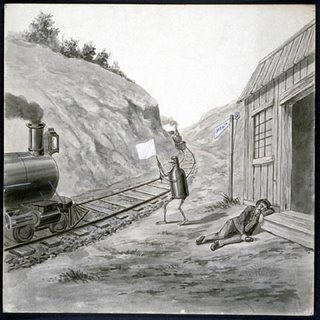
Kevin Drum claims that “the fact that Iraq is a clusterfuck” doesn’t necessarily vindicate people who were against the Bush Doctrine of preventive war, and also doesn’t necessarily prove that preventive war is wrong (he initially says “preemptive,” but then corrects himself).
Meanwhile, Megan McArdle claims that “doves” don’t deserve any credit for being right about Iraq, because “nothing that they predicted came to pass”:
If I say we shouldn't go to dinner downtown because we're going to be robbed, and we don't get robbed but we do get food poisoning, was I "right"? Only in some trivial sense. Food poisoning and robbery are completely unrelated, so my belief that we would regret going to dinner was validated only by random chance. Yet, the incident will probably increase my confidence in my prediction abilities, even though my prediction was 100% wrong.
The differences here are subtle, but important. Drum is being a schmuck, in that he suggests the invasion would’ve been acceptable if the UN had okayed it. The problem is, preventive war is illegal, so Drum’s essentially arguing that the war would’ve been better if a) it
hadn’t been illegal; or b) the UN had ignored the fact that it was illegal.
McArdle, by contrast, is either lying or nuts. Plenty of people on the left predicted treasury-draining cronyism, insurgency, sectarian violence, civil war, a bumper crop of new al-Qaeda recruits…you name it.
Atrios offers
one example. There are others. The problem wasn’t a lack of informed or even prescient dissenters; the problem was that in the rare cases where they received any attention or airtime, they were presented as charter members of Saddam’s shoeshine brigade.
Who cares, though? The important thing is, people like McArdle and Drum were
wrong for the right reasons. Sure, they may’ve been too naive, careless, cowardly, ignorant, or idealistic to be suspicious of BushCo’s motives or methods or lack of evidence. But at least they weren’t cynical (not about anyone who
mattered, anyway).
Better yet, they didn’t fool around with giant puppets, or stride around on stilts while wearing rainbow-colored wigs. They kept their dignity. And isn’t that what this is all about, in the end?
I was a good deal less reasonable, I’m sad to say, in that I noticed that the people who wanted to invade Iraq were, by and large, war profiteers and former Iran-Contra figures. I found this more frightening than Saddam's balsawood drones, just as I'd previously found Elliot Abrams' whitewashing of the
El Mozote massacre more frightening than the Sandinistas' prospective invasion of Harlingen, Texas.
In my admittedly extremist opinion, no one who’s unfamiliar with the background of these people has any business offering opinions about current American politics. And no one who
is familiar with them could believe in good faith that their peculiar combination of postmodern theatrics and old-school racketeering would lead to anything but blood-drenched disaster in Iraq.
The Bush administration and its pet advisors are people who've demonstrated over the course of several decades that they can’t sneeze without costing the taxpayers billions, and can’t open their mouths without getting innocent people killed. They’ve been morally or factually wrong on almost every important issue of our time, from apartheid to SDI to public health. But they’re never so wrong, never so dishonest, never so dangerous, and never so deserving of pitiless, unyielding skepticism as when they propose to start wars.
I know it's not considered polite to say so, but political commentators who claim not to know this are either woefully ignorant dupes, or flat-out liars. Either way, they’re a danger to themselves and others, and don’t deserve to be taken seriously on any level. At least, not without first going through the rigorous public ritual of truth-telling, apology, repudiation, and atonement that we normally demand from, say, sexually indiscreet beauty pageant winners.
And even
that’s not quite enough, really. Personally, I’m tormented by my knowledge that I could’ve and should’ve done more to stop this war before it started. The number of Iraqis we’ve killed thusfar weighs on my conscience, and makes me feel that I have blood on my hands. That’s one reason why I’m horrified by Drum’s casual claim that he turned against the war partly because “Bush wasn't serious about postwar reconstruction.”
The problem isn’t that Bush didn’t follow through on reconstruction; the problem is that commentators like Drum were foolish and ignorant enough to imagine that he might. That foolishness, that ignorance - that
lack of seriousness - has helped, however tangentially, to kill and cripple a huge number of Americans and Iraqis.
It doesn’t mean that these commentators are unforgivable, necessarily. But it
does mean that they should avoid abstracted, self-serving, pseudorationalist posturing like recovering alcoholics avoid bars.
And yet, Drum somehow finds it seemly to slap Atrios on the wrist for failing to devise a really airtight critique of the Bush Doctrine. As Iraq spirals out of control, he seems to want some acknowledgement of the fact that if everything had been completely different,
he would’ve been right.
Iraq isn’t just a “clusterfuck.” That's a tough-sounding word, maybe, but it’s really just abstract, escapist bullshit. What’s happening in Iraq is
murder, with malice aforethought, and it was enabled to a great extent by the casual contempt of people like Kevin Drum for the rule of law. Of all the political decisions an educated, intelligent person could’ve made in the last six years, the decision to support the Iraq War was by far the most serious. And if you got it wrong - if you helped, however modestly, to get us where we are today - you made just about the worst mistake you could’ve made, as an American and as a human being.
UPDATE:
Thers has come up with a clever joke about Richard Cohen; see if you can divine its grain of deadly truth.
Cohen walks out into the street wearing a paper bag over his head. He gets run over by a bus. When he wakes up in the hospital a month later, he says, "who could ever have seen it coming!" And everyone laughs as the sitcom ends and the credits roll.
































